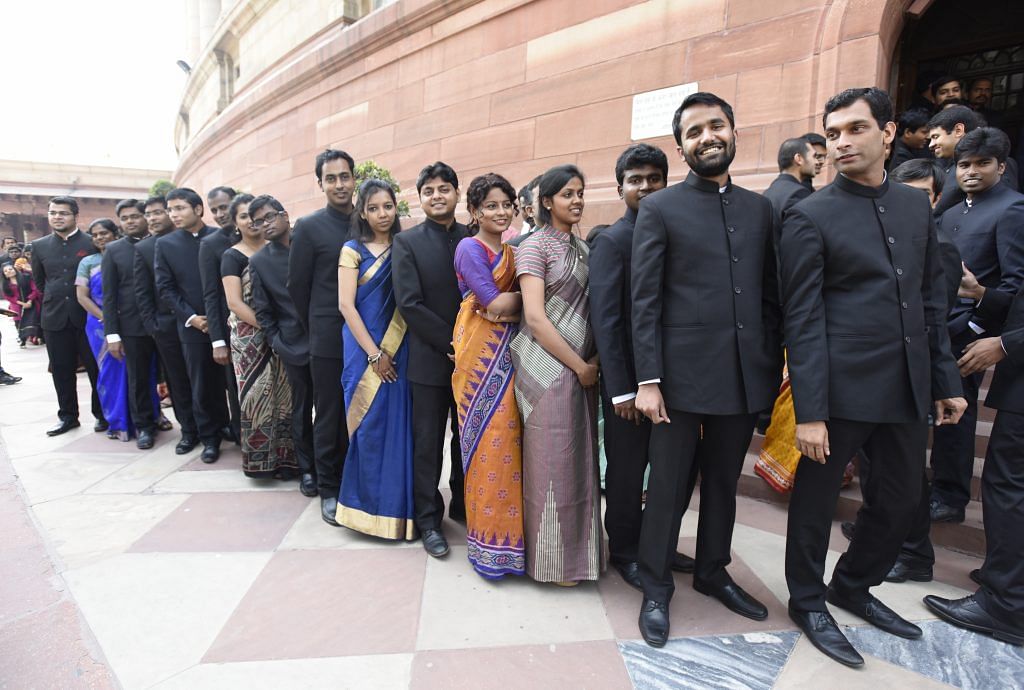IAS community’s reaction comes amid a growing debate over Modi govt’s move to allow lateral entry at joint-secretary level.
New Delhi: The IAS community seems to be upset with the newly-appointed IAS
Association president’s statement that the body is considering making a pitch to the government for qualification-based appointments to get rid of the ‘generalist’ tag attached to the officers.
This comes in the wake of a debate surrounding the Centre’s move to bring in domain experts in the government at the level of joint-secretary by way of a lateral entry.
In an interview to ThePrint last week, IAS Association president Rakesh Srivastava, who is currently the secretary in the women and child development ministry, said that to counter the view that most IAS officers lack domain expertise and are “generalists”, the IAS body will ask the government to see if it is possible to post officers according to their technical expertise.
Also read: Unhappy with ‘generalist’ tag, IAS body wants appointment based on qualification
“It is wrong to assume that IAS officers are not technically qualified. Majority of IAS officers are engineers, CAs, doctors, etc,” said Srivastava.
“They only become generalists if they are posted to an unrelated department…but it is wrong to say that they are not technically qualified.”
However, it seems Srivastava’s views have not gone down well with many of the officers.
“It is become a bit of cliché to call IAS officers ‘generalists’…They specialise in policy-making, and that is a specialisation in its own right,” former finance secretary Arvind Mayaram, said.
“It is a model of governance that has stood the test of time,” he added.
Being a ‘generalist’ is an advantage
Maintaining that generalists assume leadership roles in not just the bureaucracy, but also in other spheres such as the army or the corporate world, Mayaram said there is a need for a generalist who can supervise all aspects of policy and decision-making at the top.
“In the army, for example, those from various units report to the General…Generals, in fact, go on from being specialists to becoming generalists,” he said.
Steel secretary Aruna Sharma, whose experience ranges from information and broadcasting to home affairs, and from ayurveda to IT, also shared Mayaram’s concern. “Qualification alone does not give the capability to have a vision and translate it into reality,” she said.
“I am no graduate in dairy or IT or steel,” she added, emphasising that this would be no reason to dismiss what she brings to the table as an expert in policy-making.
Earlier this year, ThePrint had analysed the educational qualifications of 57 secretary-rank officers and found that only nine were heading ministries that have a direct relation to what they have studied.
Also read: Any connection between education of top IAS officers & jobs they do is purely coincidental
Underscoring the benefits of being a generalist, an IFS officer, who did not wish to be named, said, “Being a generalist is the biggest advantage of an IAS officer…If domain expertise becomes the criterion, then there are service-specific officers also.”
‘Fix the problem of short tenures first’
In order to ensure better governance, it is important for officers to have longer tenures in departments and ministries, thereby allowing them to develop in-depth understanding of a subject, Mayaram argued.
“First, urge the government for longer tenure as joint secretary/secretary for better governance,” he said.
Also read: Want to make central deputation for IAS officers compulsory: IAS Association president
“IAS officers develop expertise on account of long tenures in certain areas. That is why, earlier, joint secretaries typically spent five years on average in one ministry…,” he said.
“But what you see of late is that officers are transferred from one ministry to another within months. How will they develop any expertise like this?” the officer asked.
An analysis by ThePrint of the tenures of secretary-rank officers in key ministries showed that frequent changes and an abrupt end to tenures continue to be the norm under the BJP-led NDA government.
